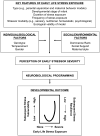Identifying key features of early stressful experiences that produce stress vulnerability and resilience in primates
- PMID: 20851145
- PMCID: PMC3023826
- DOI: 10.1016/j.neubiorev.2010.09.003
Identifying key features of early stressful experiences that produce stress vulnerability and resilience in primates
Abstract
This article examines the complex role of early stressful experiences in producing both vulnerability and resilience to later stress-related psychopathology in a variety of primate models of human development. Two types of models are reviewed: Parental Separation Models (e.g., isolate-rearing, peer-rearing, parental separations, and stress inoculation) and Maternal Behavior Models (e.g., foraging demands, variation in maternal style, and maternal abuse). Based on empirical evidence, it is argued that early life stress exposure does not increase adult vulnerability to stress-related psychopathology as a linear function, as is generally believed, but instead reflects a quadratic function. Features of early stress exposure including the type, duration, frequency, ecological validity, sensory modality, and developmental timing, within and between species, are identified to better understand how early stressful experiences alter neurobiological systems to produce such diverse developmental outcomes. This article concludes by identifying gaps in our current knowledge, providing directions for future research, and discussing the translational implications of these primate models for human development and psychopathology.
Copyright © 2010 Elsevier Ltd. All rights reserved.
Figures
References
-
- Agid O, Shapira B, Zislin J, Ritsner M, Hanin B, Murad H, et al. Environment and vulnerability to major psychiatric illness: a case control study of early parental loss in major depression, bipolar disorder and schizophrenia. Mol Psychiatry. 1999;4:163–172. - PubMed
-
- Anderson CO, Mason WA. Early experience and complexity of social organization in groups of young rhesus monkeys. J Comp Physiol Psychol. 1974;87:681–690.
-
- Anderson CO, Mason WA. Competitive social strategies in groups of deprived and experienced rhesus monkeys. Dev Psychobiol. 1978;11:289–299. - PubMed
-
- Andrews MW, Rosenblum LA. Attachment in monkey infants raised in variable- and low-demand environments. Child Dev. 1991;62:686–693. - PubMed
-
- Andrews MW, Rosenblum LA. The development of affiliative and agonistic social patterns in differentially reared monkeys. Child Dev. 1994;65:1398–1404. - PubMed
Publication types
MeSH terms
Grants and funding
LinkOut - more resources
Full Text Sources
Medical


